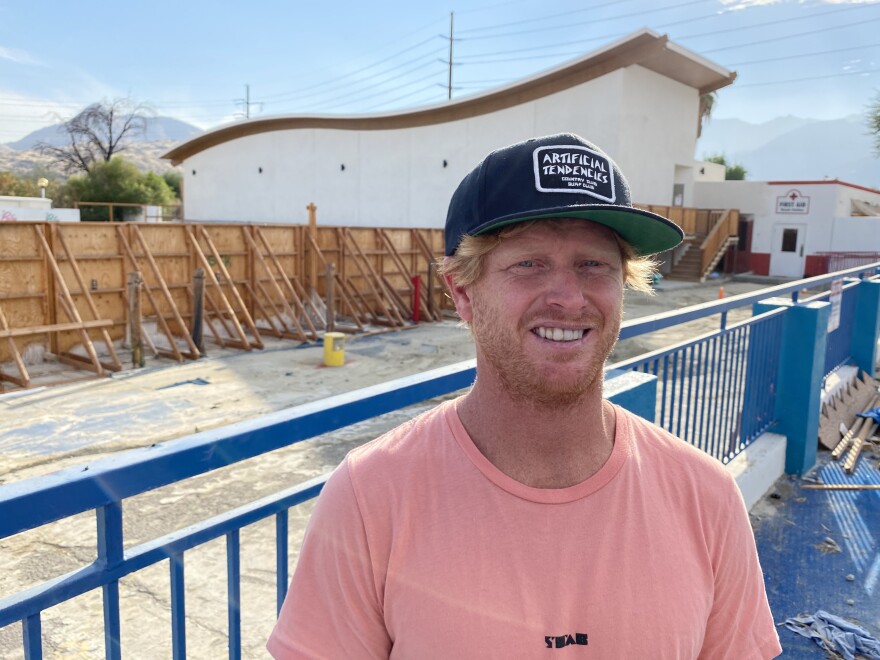Cries of "cowabunga" will soon ring out in the sprawling desert east of Los Angeles. Sun, sand, and surfing are hallmarks of Southern California's famous beaches. But, in the not-too-distant future, people who live a lot farther inland will be able to ride the waves.
It's late fall in the desert oasis of Palm Springs. That means a slight breeze and afternoon sun comfortably warming temperatures to the low 80s. While some enjoy the nice weather playing golf or sunbathing, a dedicated crew is hard at work transforming the defunct Wet 'n' Wild water park near the city's airport.
The rusting water slides are getting the boot. The new star will be the wave pool. It'll be longer, deeper, and, most importantly, perfectly curved along the bottom so it can churn out an endless set of beach-quality breakers.
"So I know the tiny little nuances that I need the wave to do to allow me to perform certain maneuvers," says Cheyne Magnusson, the guy whose job it will be to literally make waves. "If you don't know what that looks like or how to perform that maneuver yourself, how do you know how to design it?"
Magnusson grew up on the island of Maui in Hawaii and was a pro surfer by his early 20s. Now, he's more of a businessman. Magnusson is one of the primary backers of the new Palm Springs Surf Club. He also happens to be its "chief hydro officer," a made up title at which even he chuckles.
The permanently tan 37-year-old with wild blonde hair will basically be a wave DJ, controlling and mixing the water through a system of pumps that can make everything from little lapping waves to big barrels.
Two other surf parks are also on the horizon for the desert. Magnusson says there's a reason the inland Coachella Valley, a couple hours from the actual ocean, is a magnet for these places.
"The heartbeat of the surf industry has always been Southern California, so you have this just overwhelmingly surf-centric population that's a two hour drive," says Magnusson. "And the other thing we know about surfers is they love to take trips."
If two hours from the shore seems like a long way, before coming to Palm Springs, Magnusson was the wave DJ at a surf park at a very inland Waco, Texas. He says more than a quarter of the business there was surfers who came to Texas from the Golden State.
The developers are banking on a built-in California surfer base. But, Scott White, the head of the tourism agency that markets the Coachella Valley, thinks the consistent desert weather will play a part in bringing the beach set east.
"I can't tell you how many times I leave here and the sun is out and I get to the coast and it's cloudy, foggy, misty — it's cold," says White. "We're going to provide the perfect wave with the perfect weather."
For the record, Palm Springs sees more than 300 sunny days a year.

About 200 miles northwest of Palm Springs, along the scenic Highway 1, is Rincon Beach. As the afternoon fades and actual ocean waves crash along the narrow strip of sand, Eddie Garcia is sitting on his board in the Pacific.
The 33-year-old has been surfing in the ocean since he was 14. He doesn't mind the promise of the desert's endless sun; it's the repeatable perfection of a surf park wave that doesn't sit well with him.
"It's kind of cool to have that unknown factor, you know," says Garcia.
"Every wave is kind of different," Garcia says. "Crappy days are still fun, you know, if you can look at it a little different."
In the water, Garcia is in his wetsuit and bobs on his board while waiting for the right wave to come along. When it finally does, he turns towards shore, paddles like a maniac, then stands up and rides it in, making it look easy.
He gets that a desert surf park could be a great training tool for pros and could introduce new people to the sport, but there's no cost to grab your board and paddle out in the ocean.
As to whether he'd hit up one of the surf parks, Garcia pauses and thinks before answering. After a moment, he lets out a very protracted response.
"Maybe; we'll see," Garcia says.
With the first of the parks set to open in 2022, there's still plenty of time for him to make up his mind.
Copyright 2020 KCRW



